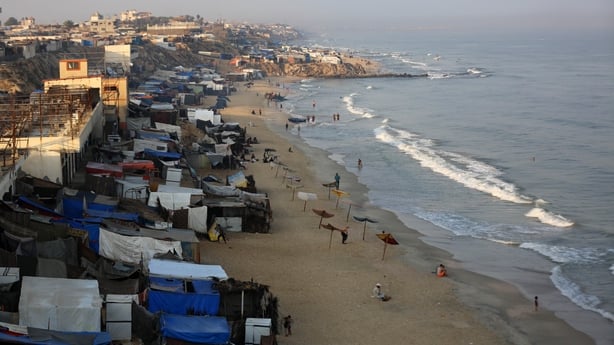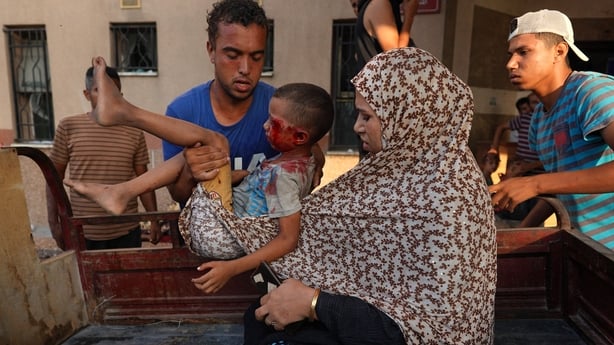Palestinians displaced by fighting in Gaza crowded onto the seashore as Israeli forces continued to battle Hamas fighters in central and southern areas, with health officials reporting at least 17 people killed in strikes this morning.
Ceasefire talks were continuing in Cairo with little sign of a concrete breakthrough over key issues separating the sides, including future control over two corridors in Gaza once fighting ends.
In recent days, Israel has issued several evacuation orders across Gaza, the most since the beginning of the 10-month war, prompting an outcry from Palestinians, the United Nations, and relief officials over the reduction of humanitarian zones and the absence of safe areas.
Residents and displaced families in the southern city of Khan Younis and Deir Al-Balah, in central Gaza, where most of the population is now concentrated, said they have been pushed to live in tents now packed on the beach.

"Maybe they should bring ships, so next time they order people to leave we can jump there, people are now on the beach near the seawater," said one woman.
"Every day they say talks are progressing, an agreement is close, then all falls like dust. Do negotiators know that everyday more families get wiped out by Israeli bombardment? Does the world understand that every day more costs us more lives?" she told Reuters via a chat app.
Palestinian health officials said Israeli strikes killed nine Palestinians in Bureij and Maghazi, two of Gaza's eight historic refugee camps, while another strike killed five people in Khan Younis and a third killed three others in Rafah.
More than 40,400 Palestinians have been killed in the war, according to Gaza's health ministry.
The crowded territory has been laid to waste and most of its 2.3 million people have been displaced multiple times and face acute shortages of food and medicine, humanitarian agencies say.
The conflict was triggered after Hamas militants stormed into southern Israel on 7 October killing 1,200 people and taking more than 250 hostages, according to Israeli tallies.
Yesterday, United Nations aid operations in Gaza ground to a halt after Israel issued new evacuation orders on Sunday for Deir Al-Balah, where the UN operations centre was located, a senior UN official said.

The evacuation order came as the UN has been preparing a campaign to vaccinate an estimated 640,000 children in Gaza against polio, after at least one case of the disease was identified.
As the fighting continued, negotiators in Cairo continued meetings aimed at halting the fighting and bringing 109 Israeli and foreign hostages home in an exchange deal for Palestinian prisoners.
Although there has been optimism from the United States, which is supporting the talks along with Egypt and Qatar, Hamas and Israel have been trading blame for a lack of progress.
Among the main sticking points has been Israel's insistence on maintaining control over the so-called Philadelphi corridor on the border with Egypt, which Israel says has been used as one of the main routes for smuggling weapons into Gaza.
Israel has also insisted on checks on people moving from southern and central Gaza into northern areas across the Netzarim corridor, running across the centre of Gaza, saying it needs to ensure armed fighters cannot move north.

